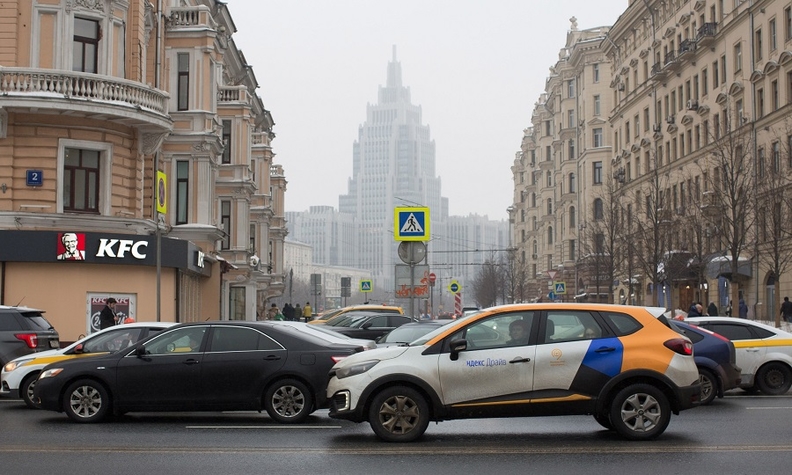MOSCOW -- When Evgeny Barkov owned a car, the 31-year-old software salesman would often look out of his Moscow window at it with disgust. His possession sat unused more than 90 percent of time, while sucking up money and causing him anxiety that it might break down.
He finally took out a calculator, added up all the costs and determined he was better off selling his gray Peugeot and switching completely to short-term car rental services such as Yandex.Drive, which offers cars ranging from basic Kia models to expensive Porsches.
"That investment brought me nothing but trouble," said Barkov as he wound through Moscow's snowy streets in a white Skoda sedan with a bright yellow stripe on the side and Yandex's software on the dashboard console. "Now, I'm just paying for using."
The venture, which set up last year by a local Internet company, flooded the Russian capital with more than 7,000 cars to rent for as little as 5 rubles (8 cents) per minute, including fuel, maintenance and parking. That compares to 41 cents a minute for Daimler's Car2Go in New York and is an offer too good to pass up for a growing number of Muscovites.
Biggest fleet
Almost out of nowhere, short-term rental in Moscow boomed, with the number of vehicles more than tripling last year. The city now has the biggest shared fleet in Europe and the second-largest in the world after Tokyo. The rapid shift spells trouble for automakers by providing a blueprint for how a deep-pocketed technology player can move quickly to woo consumers with alternatives to traditional car ownership.
"We are approaching a point that could flip the entire car market on its head,2 said Shwetha Surender, a London-based analyst with consultancy Frost & Sullivan. "Carmakers risk becoming mere suppliers to shared mobility services and losing direct relations with customers. That's an unattractive proposition."
To be sure, automakers are seeking to head off the risk. Daimler and BMW merged their short-term rental ventures to gain greater scale. Volkswagen is testing its Moia ride-sharing service in Hamburg, while General Motors has invested in Lyft.
They all somehow missed Russia's biggest city, with more than 12 million people. Daimler's Car2Go, BMW's DriveNow and Avis Budget Group's Zipcar are all no-shows, even though its notoriously clogged streets—Moscow is ranked as the world's second-worst city for traffic congestion—were ripe for disruption and authorities were practically begging short-term companies to invest.
Aggressive investment
Paid parking was introduced in the city center in 2013 and is generally booked via app—training residents to use smartphone features for their transport needs. A day’s worth of curbside parking could cost about $30, making it the largest daily expense for many Russian drivers. Short-term car rental providers get discounted rates of roughly $400 a year.
Yandex took advantage, swarming Moscow streets last year with vehicles such as Renault Captur crossovers, BMW 5-series sedans and even Porsche 911 sports cars. Its aggressive investment made it the market leader ahead of local rivals Delimobil and BelkaCar.
At the end of 2018, there were 16,500 short-term rental vehicles in the city, and Moscow’s Transportation Department expects the number to rise by 5,000 vehicles annually in the coming years. The fleet expansion trailed a boom in users as rides more than quadrupled to 23 million.
“Russia started car-sharing later than other countries, but due to this we were able to deploy the latest technologies,” said Anton Ryazanov, head of Yandex.Drive, which expanded to St. Petersburg in December. “Now, the Russian market is taken by local car-sharing firms, and the entrance of large international players is unlikely.”
Yandex is Russia’s version of Google and has taken advantage of its strategic position at the center of the digital economy to deepen ties with consumers through services ranging from shopping sites to music streaming. The company began its push into transport services with cab-hailing app Yandex.Taxi in 2011, now Russia’s largest. It controls Uber Technologies’ business in the region.


